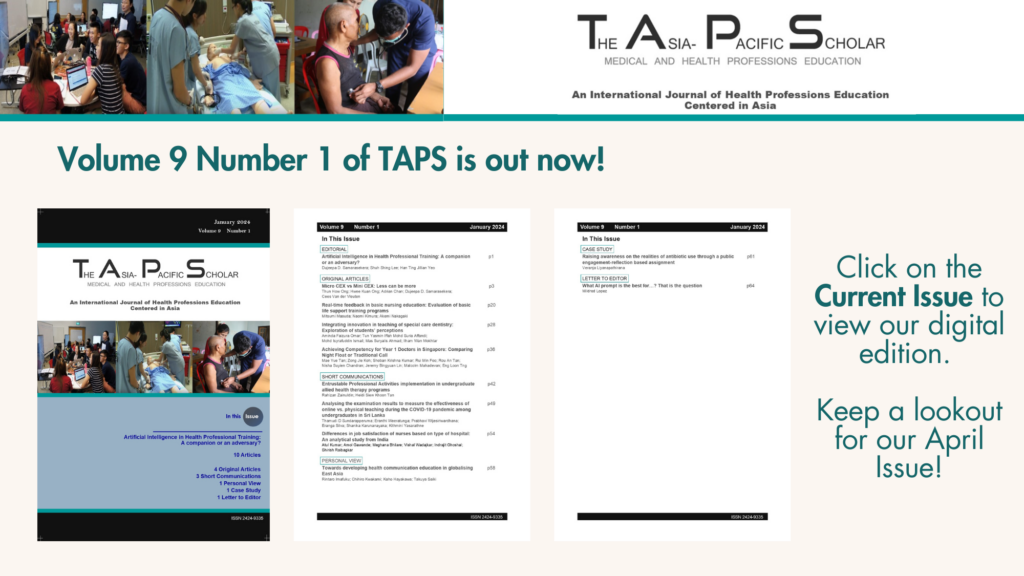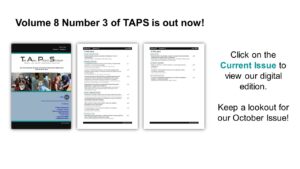The ties that bind – Learning groups in family medicine residency
Submitted: 21 February 2020
Accepted: 3 June 2020
Published online: 5 January, TAPS 2021, 6(1), 125-127
https://doi.org/10.29060/TAPS.2021-6-1/PV2228
Chooi Peng Ong, Cindy Shiqi Zhu, Desmond SL Ong & Ying Pin Toh
Family Medicine Residency, National University Health System, Singapore
I. INTRODUCTION
Family medicine training encompasses the need to develop a diverse skillset and the ability to practice in different settings. During three years of training, family medicine residents from National University Health System (NUHS) rapidly transit through many hospital rotations with varying specialty-specific competency requirements. Throughout this period, each resident is rostered to run a half-day primary care clinic on the same day each week and is assigned a dedicated faculty member to supervise him during the session. Each faculty member is assigned up to four to six residents for the half-day sessions every week. There is a need to contextualise what is learnt in hospital to primary care, and to effectively integrate knowledge across disciplines. We describe here a tool that the NUHS family medicine residency has used to bring together faculty and residents of varying seniorities and locations for discussion, reflection, and growth.
II. METHODS
A. What We Did
Over the past few years, learners’ groups have been created by residency faculty and residents on a voluntary basis, using an internet-based group messaging platform. As described here, the group is defined by a common supervising faculty member and is formed for the duration of the academic year. The supervisor is also the group administrator and main facilitator.
The platform described here is the WhatsApp messaging platform. It was chosen because of the ubiquity of its use by the faculty and resident bodies as well as the closed nature of the groups, in that membership is by invitation, and messages are encrypted (WhatsApp Inc., n.d.). An additional benefit was that, unlike some dedicated healthcare messaging applications, the messages and shared resources are not automatically deleted (Geron, 2011) after a period of time.
The WhatsApp group chat functions as a virtual community board for clinical learning, questions, answers, and clarification. Topics discussed usually arise from residents’ clinic encounters, and the emphasis of discussion is on contextualising knowledge from books and hospital learning to real-life primary care practice. For example, a patient is seen for chronic disease management and is noted to smoke cigarettes. The post-consultation debrief may include a suggestion to read up on nicotine replacement strategies (NRT), following which the resident may upload an update on NRT to the chat group. Case-based discussion proceeds asynchronously and is facilitated by the supervisor and contributed to by all group members. Notably, case discussions involving patients are anonymised, and the use of unique personal identifiers is prohibited. Additionally, the group platform allows discussion and opinion to evolve on current issues relating to professionalism and ethics. Over time, the group chat messages become a useful depository of contextualised, opportunistic, experiential learning for the group.
III. DISCUSSION
A. Potential Pitfalls
The commonest pitfall is the tendency for resources shared to be comprehensive textbook-like knowledge updates, whereas the more useful type of update is a distilled, pragmatic one that can be directly applied to practice. It is often noted that group participation tends to wane as the year progresses, possibly due to an increase in coursework and examination preparation. Some group members tend to participate more freely than others. Unlike a face-to-face group, the quiet members may be virtually forgotten by others over the course of the year unless effort is made to engage them.
The openness of the discussion can be affected by traditional medical hierarchies and the facilitator may need to intentionally address this. It is important to recognise that the richness of discourse is largely dependent on the quality of moderation and on participant engagement. Finally, as topics for discussion are identified opportunistically, the same topics may be repeatedly identified.
B. Tips for Managing the Group
The tone and culture of the group will greatly affect the efficacy of group interactions. It is important to set ground rules of courtesy, freedom to question, and expectations of participation early in the group’s life cycle. Also, while the facilitator needs to encourage active participation with provocative questioning, the senior residents need to help set the tone of egalitarian discussion, in order for younger participants to feel sufficiently comfortable to contribute willingly. Having a co-facilitator who is another faculty member or a resident who was a member of a past-year group has helped in establishing the group’s openness and activeness, with varying degrees of success.
It is important for the facilitator to have an idea of what broad topics ought to be discussed over the lifespan of the group, which is often the duration of the academic year. This ensures that discussions are guided beyond the strictly opportunistic. The length of contributions should not exceed the attention span of those reading. As a suggestion, the length of an uploaded update should not exceed the size of a smartphone screen, the emphasis being on curated pearls.
It is important to emphasise an academic focus, to ensure the group does not devolve into a social support group. This is not because social support is secondary, but because these WhatsApp groups, as described here, were set up to further academic objectives. Social greetings are therefore largely relegated to alternative message boards and private messages. Nevertheless, it is recognised that a functional group will have social elements, and that social greetings may be an indicator of group cohesion and viability (Salas, Grossman, Hughes, & Coultas, 2015).
As with any group that interacts over time, an informal curriculum (Rogoff, Callanan, Gutiérrez, & Erickson, 2016) will run in parallel with the explicit curriculum and will eventually impact on learner attitudes and even values. It is important for the facilitator to reflect on the elements of his informal/implicit curriculum and to intentionally drive it. Examples of these elements may include personal integrity, collegiality, or independent questioning.
IV. CONCLUSION
The WhatsApp chat groups described here have allowed us to extend study group discussions beyond the clinic. This is particularly useful in family medicine training where the contextualization of a broad knowledge base needs to be constant and relentless, and opportunities for face-to-face meetings are limited by logistics. The extended virtual discussion is also a useful platform by which to teach affective domain skills, such as attitudes and values. Because of the iterative nature of clinic sessions intercalated with online discussions, learning can be reflected on and applied and may be postulated to occur at up to Kirkpatrick level 3 (Kirkpatrick & Kirkpatrick, 2006). Finally, by bringing together learners of varying seniorities, role modelling, mentoring, camaraderie, and certain emotional support are happy by-products.
Notes on Contributors
Ong Chooi Peng is a faculty member of the NUHS family medicine residency program. She runs several virtual groups, reviewed the literature, and wrote the manuscript.
Desmond Ong is a faculty member of the NUHS family medicine residency program. He also runs virtual groups and helped edit the manuscript.
Cindy Zhu Shi Qi and Toh Ying Pin are residents within the NUHS family medicine residency program. They belong to virtual groups and helped edit the manuscript.
Acknowledgements
The authors acknowledge the generations of NUHS family medicine residents who have contributed to the development and evolution of the virtual groups, to the current form of WhatsApp groups described here.
Funding
The authors received no funding for this work.
Declaration of Interest
The authors declare no conflict of interest.
References
Geron, T. (2011, June 15). TigerText secures (and erases) your text messages. Retrieved January 20, 2020, from https://tigerconnect.com/newsroom/tigertext-secures-and-erases-your-text-messages/
Kirkpatrick, D. L., & Kirkpatrick, J. D. (2006). Evaluating Training Programs. New York, NY: Macmillan Publishers.
Rogoff, B., Callanan, M., Gutiérrez, K., & Erickson, F. (2016). The organization of informal learning. Review of Research in Education, 40(1), 356-401. https://doi.org/10.3102/0091732×16680994
Salas, E., Grossman, R., Hughes, A., & Coultas, C. (2015). Measuring team cohesion. Human Factors: The Journal of the Human Factors and Ergonomics Society, 57(3), 365-374. https://doi.org/10.1177/0018720815578267
WhatsApp Inc. (2020, January 20). WhatsApp Security: Privacy and Security is in our DNA. Retrieved from http://www.whatsapp.com/security/
*Cindy Shiqi Zhu
1E Kent Ridge Road,
Singapore 119228
National University Health System (NUHS)
Email: Shi_Qi_ZHU@nuhs.edu.sg
Announcements
- Fourth Thematic Issue: Call for Submissions
The Asia Pacific Scholar is now calling for submissions for its Fourth Thematic Publication on “Developing a Holistic Healthcare Practitioner for a Sustainable Future”!
The Guest Editors for this Thematic Issue are A/Prof Marcus Henning and Adj A/Prof Mabel Yap. For more information on paper submissions, check out here! - Best Reviewer Awards 2023
TAPS would like to express gratitude and thanks to an extraordinary group of reviewers who are awarded the Best Reviewer Awards for 2023.
Refer here for the list of recipients. - Most Accessed Article 2023
The Most Accessed Article of 2023 goes to Small, sustainable, steps to success as a scholar in Health Professions Education – Micro (macro and meta) matters.
Congratulations, A/Prof Goh Poh-Sun & Dr Elisabeth Schlegel! - Best Article Award 2023
The Best Article Award of 2023 goes to Increasing the value of Community-Based Education through Interprofessional Education.
Congratulations, Dr Tri Nur Kristina and co-authors! - Volume 9 Number 1 of TAPS is out now! Click on the Current Issue to view our digital edition.

- Best Reviewer Awards 2022
TAPS would like to express gratitude and thanks to an extraordinary group of reviewers who are awarded the Best Reviewer Awards for 2022.
Refer here for the list of recipients. - Most Accessed Article 2022
The Most Accessed Article of 2022 goes to An urgent need to teach complexity science to health science students.
Congratulations, Dr Bhuvan KC and Dr Ravi Shankar. - Best Article Award 2022
The Best Article Award of 2022 goes to From clinician to educator: A scoping review of professional identity and the influence of impostor phenomenon.
Congratulations, Ms Freeman and co-authors. - Volume 8 Number 3 of TAPS is out now! Click on the Current Issue to view our digital edition.

- Best Reviewer Awards 2021
TAPS would like to express gratitude and thanks to an extraordinary group of reviewers who are awarded the Best Reviewer Awards for 2021.
Refer here for the list of recipients. - Most Accessed Article 2021
The Most Accessed Article of 2021 goes to Professional identity formation-oriented mentoring technique as a method to improve self-regulated learning: A mixed-method study.
Congratulations, Assoc/Prof Matsuyama and co-authors. - Best Reviewer Awards 2020
TAPS would like to express gratitude and thanks to an extraordinary group of reviewers who are awarded the Best Reviewer Awards for 2020.
Refer here for the list of recipients. - Most Accessed Article 2020
The Most Accessed Article of 2020 goes to Inter-related issues that impact motivation in biomedical sciences graduate education. Congratulations, Dr Chen Zhi Xiong and co-authors.









